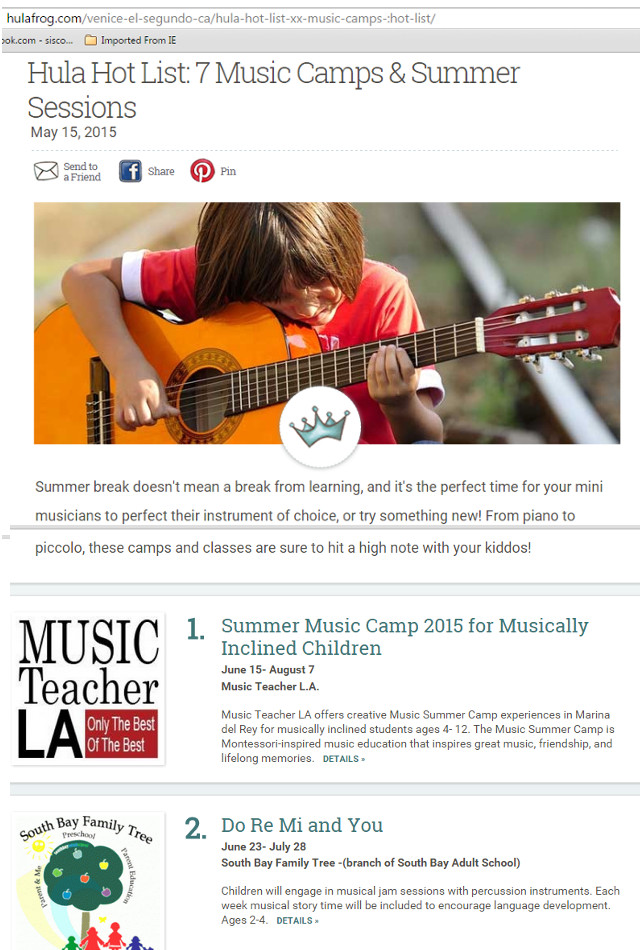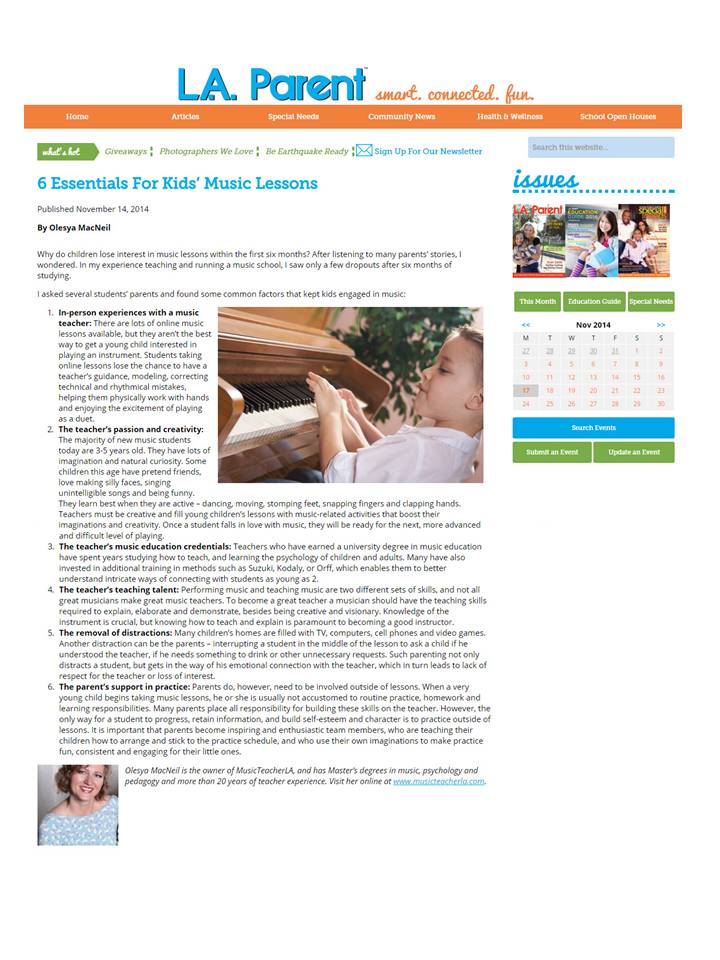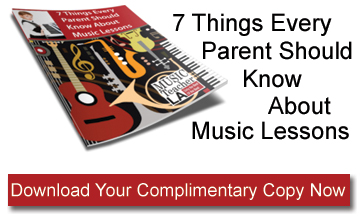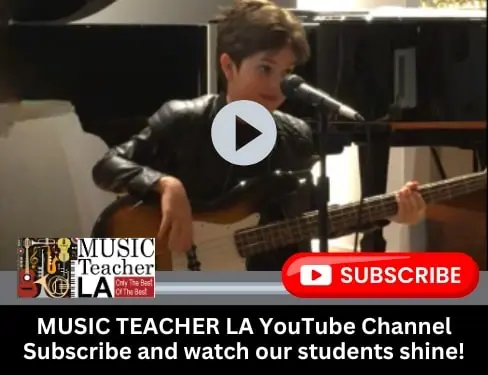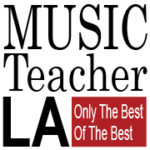Music Teacher LA in the Spotlight: Press Coverage
“Back-to-school Readiness for Music Students” by Olesya MacNeil, published in L.A. Parent on August 14, 2016
As a piano teacher and the founder of Music Teacher LA, I am 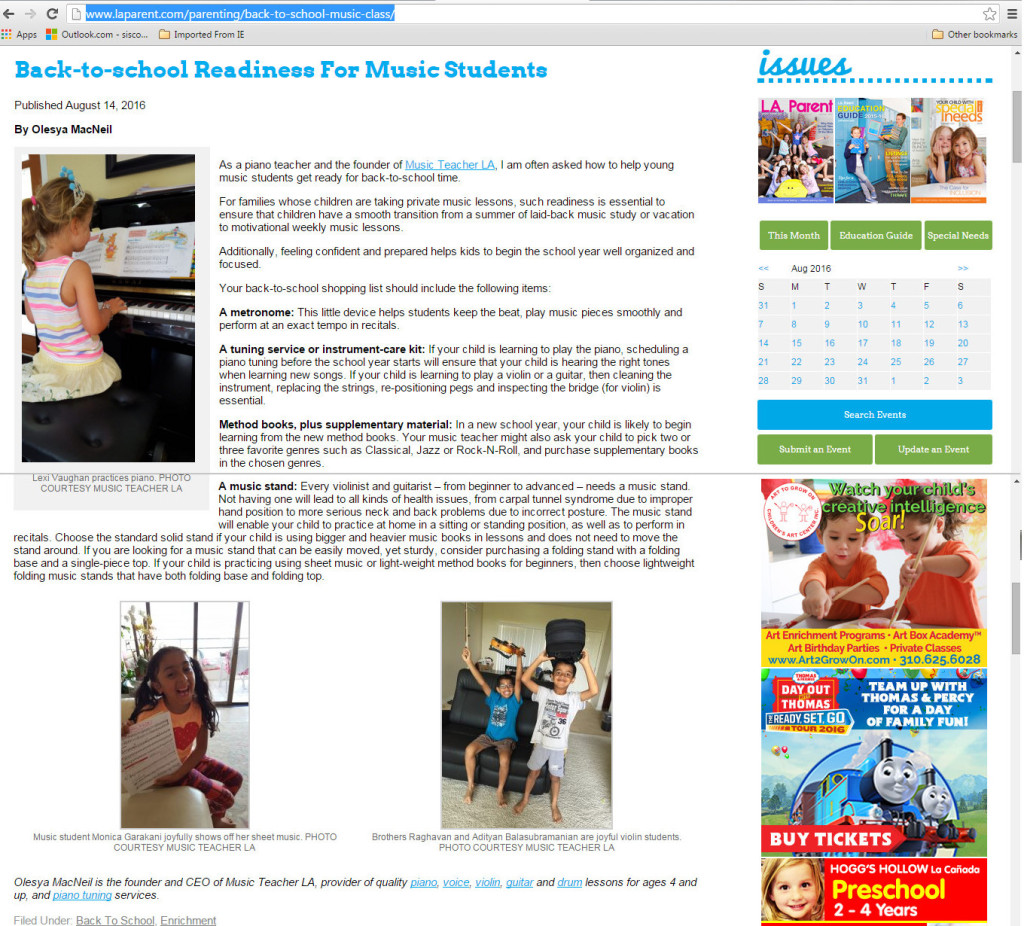 often asked how to help young music students get ready for back-to-school time.
often asked how to help young music students get ready for back-to-school time.
For families whose children are taking private music lessons, such readiness is essential to ensure that children have a smooth transition from a summer of laid-back music study or vacation to motivational weekly music lessons.
Additionally, feeling confident and prepared helps kids to begin the school year well organized and focused.
Your back-to-school shopping list should include the following items:
A metronome: This little device helps students keep the beat, play music pieces smoothly and perform at an exact tempo in recitals.
A tuning service or instrument-care kit: If your child is learning to play the piano, scheduling a piano tuning before the school year starts will ensure that your child is hearing the right tones when learning new songs. If your child is learning to play a violin or a guitar, then cleaning the instrument, replacing the strings, re-positioning pegs and inspecting the bridge (for violin) is essential.
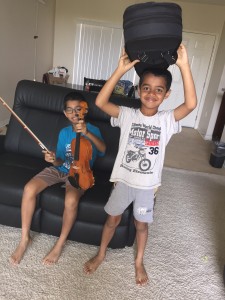 Method books, plus supplementary material: In a new school year, your child is likely to begin learning from the new method books. Your music teacher might also ask your child to pick two or three favorite genres such as Classical, Jazz or Rock-N-Roll, and purchase supplementary books in the chosen genres.
Method books, plus supplementary material: In a new school year, your child is likely to begin learning from the new method books. Your music teacher might also ask your child to pick two or three favorite genres such as Classical, Jazz or Rock-N-Roll, and purchase supplementary books in the chosen genres.
A music stand: Every violinist and guitarist – from beginner to advanced – needs a music stand. Not having one will lead to all kinds of health issues, from carpal tunnel syndrome due to improper hand position to more serious neck and back problems due to incorrect posture. The music stand will enable your child to practice at home in a sitting or standing position, as well as to perform in recitals. Choose the standard solid stand if your child is using bigger and heavier music books in lessons and does not need to move the stand around. If you are looking for a music stand that can be easily moved, yet sturdy, consider purchasing a folding stand with a folding base and a single-piece top. If your child is practicing using sheet music or light-weight method books for beginners, then choose lightweight folding music stands that have both folding base and folding top.
Be the coolest child on the block with the “8 Creativity Boosters for Kids” by Olesya MacNeil, published in L.A. Parent on February, 23, 2016
One of our jobs as parents is to find new ways to inspire and encourage our children’s curiosity, creativity and interest in the world around them. Try these eight tips to spark your child’s inner artist, actor or architect.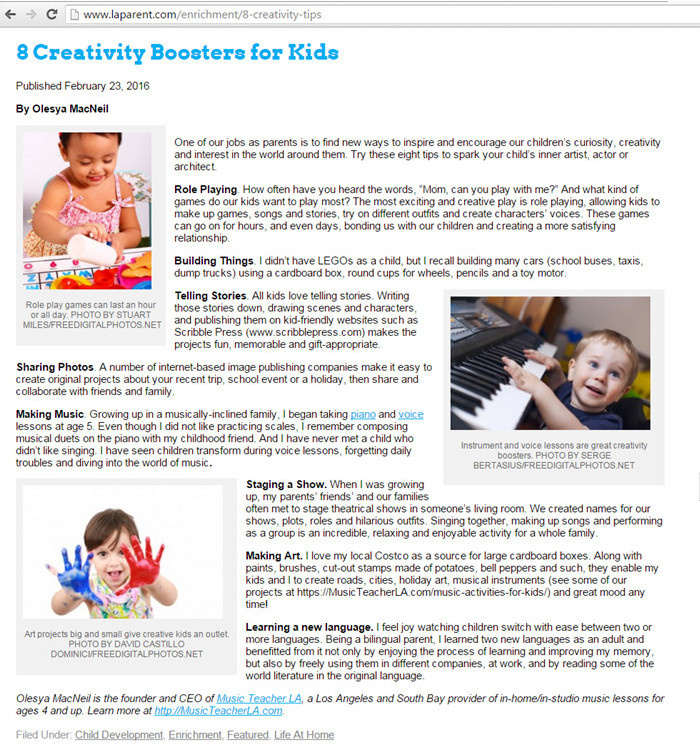
Role Playing. How often have you heard the words, “Mom, can you play with me?” And what kind of games do our kids want to play most? The most exciting and creative play is role playing, allowing kids to make up games, songs and stories, try on different outfits and create characters’ voices. These games can go on for hours, and even days, bonding us with our children and creating a more satisfying relationship.
Building Things. I didn’t have LEGOs as a child, but I recall building many cars (school buses, taxis, dump trucks) using a cardboard box, round cups for wheels, pencils and a toy motor.
Sharing Photos. A number of internet-based image publishing companies make it easy to create original projects about your recent trip, school event or a holiday, then share and collaborate with friends and family.
Telling Stories. All kids love telling stories. Writing those stories down, drawing scenes and characters, and publishing them on kid-friendly websites such as Scribble Press (www.scribblepress.com) makes the projects fun, memorable and gift-appropriate.
Making Music. Growing up in a musically-inclined family, I began taking piano and voice lessons at age 5. Even though I did not like practicing scales, I remember composing musical duets on the piano with my childhood friend. And I have never met a child who didn’t like singing. I have seen children transform during voice lessons, forgetting daily troubles and diving into the world of music.
Staging a Show. When I was growing up, my parents’ friends’ and our families often met to stage theatrical shows in someone’s living room. We created names for our shows, plots, roles and hilarious outfits. Singing together, making up songs and performing as a group is an incredible, relaxing and enjoyable activity for a whole family.
Making Art. I love my local Costco as a source for large cardboard boxes. Along with paints, brushes, cut-out stamps made of potatoes, bell peppers and such, they enable my kids and I to create roads, cities, holiday art, musical instruments (see some of our projects here: Music DIY for Kids) and great mood any time!
Learning a new language. I feel joy watching children switch with ease between two or more languages. Being a bilingual parent, I learned two new languages as an adult and benefitted from it not only by enjoying the process of learning and improving my memory, but also by freely using them in different companies, at work, and by reading some of the world literature in the original language.
Olesya MacNeil is the founder and CEO of Music Teacher LA, a Los Angeles and South Bay provider of in-home/in-studio music lessons for ages 4 and up. Learn more at http://MusicTeacherLA.com.
“Is Your Child Ready for Piano Lessons?” by Olesya MacNeil, published in L.A. Parent on February 17, 2016
Parents who enroll their children in music lessons  can provide a powerful boost for their youngsters’ overall development. A number of studies suggest that formal music lessons help develop hand-eye coordination, improve language skills, teach children to use both the left and right side of the brain simultaneously, instill confidence and develop discipline, patience and music appreciation. Additionally, studies show that adults who played instruments during childhood have sharper hearing in old age.
can provide a powerful boost for their youngsters’ overall development. A number of studies suggest that formal music lessons help develop hand-eye coordination, improve language skills, teach children to use both the left and right side of the brain simultaneously, instill confidence and develop discipline, patience and music appreciation. Additionally, studies show that adults who played instruments during childhood have sharper hearing in old age.
I have found that piano is the easiest first instrument for young children to learn.
- The child just needs to press the key to produce a sound.
- The concept of positioning both hands on the keys is easily understood.
- Kids who start taking piano lessons at age 4-5 naturally curve their fingers, giving them an edge in learning proper hand position.
- Knowledge acquired in piano lessons can later be applied to any other instrument.
So, what is the best age to begin taking piano lessons?
My personal experience teaching private piano lessons since 1991, backed by the results of research both here and abroad, shows that children benefit from starting formal piano training as early as age 4, when brain circuits for learning music mature. However, since every child is individual in his abilities and development, it is important to evaluate a child’s emotional, mental and physical readiness before engaging them in piano lessons. Your parental readiness and support are also essential.
>>CONTINUE READING HERE: Best Age to Begin Piano Lessons
“How to Raise a Musical Child” by Olesya MacNeil, published on Answers.com on August 25, 2015
[Exert ONLY. Read the full article at http://music.answers.com/childrens/how-to-raise-a-musical-child]
“Three Powerful Ways to Motivate Summertime Music Practice” by Olesya MacNeil, published in L.A. Parent on July 7, 2015
As a teacher, I am frequently asked how to encourage children to practice during summer break and school holidays. Some experts believe children who do not practice (or rarely practice) during summer will need one additional month of practice to recover their skill at the end of the holiday.
So, what can you do?
Get involved. Ask your child about the piece 
he or she is working on. Sit with your child and encourage her or him to practice one phrase at a time, polishing difficult prats. Set a specific number of times to practice each piece. Play an instrument along with your child, or clap your hands along with your child as he or she plays.
Have fun! Play a game. Encourage your child to try new things, such as practicing with his or her eyes closed, or playing slow, then fast, quiet, then loud. Make up a holiday song together. Get physical by wiggling your head or dancing while you play.
Set a reasonable goal. We all need a holiday break, so determine how many days you would like your child to practice during the summer. If your child is learning to play piano and there is no piano on your family trip, then pack flash cards to practice music notation, play musical games to exercise your child’s knowledge of music theory, or buy a hand exerciser to strengthen your child’s fingers.
How many adults do you know who wish their parents had encouraged them to practice when they were children? Remember: No one regrets learning an instrument. Encourage your young musicians now, and they will thank you later.
Olesya MacNeil is the founder of Music Teacher LA, which provides in-home and in-studio music lessons (piano, voice, violin, guitar, drum and woodwinds) and piano tuning services in Los Angeles and the South Bay.
Music Teacher LA made the 1st Top Place in the Hulafrog Summer Camps’ Hot List- May 15, 2015
Music Teacher LA has been Selected #1 Hot Summer Camp by Hulafrog, the ultimate guide to local events and activities for kids.
Thank you everyone who voted for us!!!
Read more at http://hulafrog.com/…/hula-hot-list-xx-music-camps-:hot-li…/
…



